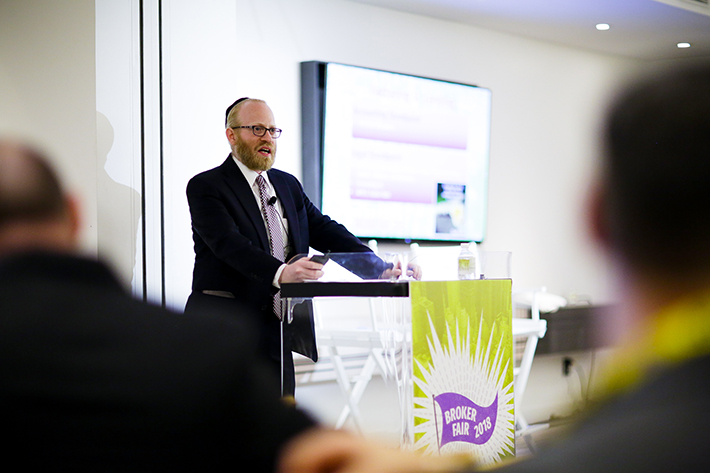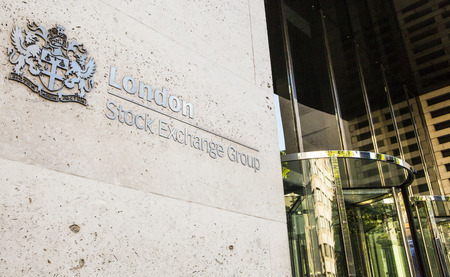Industry News
In New Jersey, Yellowstone Capital Buoys Volunteer Ambulance Organization
October 19, 2018 Hatzalah of Union County, New Jersey, a volunteer ambulance organization, has saved hundreds of lives thanks to its volunteer-only team and its three ambulances, all funded by donations from Yellowstone Capital CEO Isaac Stern and the company’s employees over the past seven years. Total donations from Yellowstone Capital, including from Stern, have exceeded $300,000.
Hatzalah of Union County, New Jersey, a volunteer ambulance organization, has saved hundreds of lives thanks to its volunteer-only team and its three ambulances, all funded by donations from Yellowstone Capital CEO Isaac Stern and the company’s employees over the past seven years. Total donations from Yellowstone Capital, including from Stern, have exceeded $300,000.
“[Stern] is our largest supporter and he spreads through Yellowstone the opportunity to give,” said Yudi Abraham, chief of the Union County Hatzalah operation. “He’s gotten everyone there into the idea of giving back.”
In 2015, Stern held a fundraiser barbecue dinner at his home and in a subsequent year, he organized a fundraiser barbecue in a public New Jersey park, to accommodate more people.
 While Hatzalah (which means “rescue” in Hebrew) is primarily a Jewish organization, anyone – regardless of background – can call the hotline and get emergency medical attention, free of charge. The emergency number varies depending on where you live. The first Hatzalah emergency team was founded in Brooklyn in the late 1960s and the Hatzalah of Union County was started in 2004.
While Hatzalah (which means “rescue” in Hebrew) is primarily a Jewish organization, anyone – regardless of background – can call the hotline and get emergency medical attention, free of charge. The emergency number varies depending on where you live. The first Hatzalah emergency team was founded in Brooklyn in the late 1960s and the Hatzalah of Union County was started in 2004.
Abraham explained that the Hatzalah model is different from 911 ambulances in that the all-volunteer force generally arrives within three minutes in their own personal vehicles that are equipped with oxygen, a defibrillator, a full trauma kit and an emergency childbirth kit. The Hatzalah ambulance then arrives at the scene shortly minutes later.
Over the past year, with donations from Yellowstone, Hatzalah of Union County has upgraded its emergency radio dispatch system from analog to digital, Abraham said.
“Yellowstone has truly been a partner for us,” Abraham said.
OnDeck Launches New Subsidiary
October 16, 2018 OnDeck announced today that it has created a new subsidiary, called ODX, which will help banks become more efficient online lenders. OnDeck’s CEO Noah Breslow told deBanked that ODX is an expansion of OnDeck’s successful partnership with JPMorgan, which started in 2016.
OnDeck announced today that it has created a new subsidiary, called ODX, which will help banks become more efficient online lenders. OnDeck’s CEO Noah Breslow told deBanked that ODX is an expansion of OnDeck’s successful partnership with JPMorgan, which started in 2016.
“We created what at the time was I think a pretty groundbreaking partnership with the largest bank in the country,” Breslow said. “Now today, we’re funding loans very efficiently using our platform and [Chase’s] marketing and their balance sheet. And it really is sort of the promise of a fintech working with a bank. So we decided strategically this year to really make a big bet in this area…[and create] a company that’s going to support many banks.”
OnDeck has chosen Brian Geary to serve as president of ODX. Breslow said this is because Geary launched and oversaw the collaboration with Chase, whereby OnDeck built a digital bank originations platform for the bank.
“Geary has really been the focal point of that entire effort,” Breslow said, “so he was a very natural choice to head this up.”
OnDeck has drawn talent from among its existing employees to create this company, but it also hired Raj Kolluri to serve as Head of Product and Technology for ODX. And Geary said they are actively hiring to build the team. Kolluri comes from SS&C Primatics, a software company, where he served as Vice President of Product and Engineering, helping to build the company’s software as a service analytics platform for banks.
When asked if helping banks to become faster online lenders is a way of aiding OnDeck’s own competitors, Geary said he didn’t see it that way.
“We don’t view it as competitive,” Geary said. “The banks and OnDeck are playing in different segments of the market. [Banks] have a tighter risk tolerance and certain customers they can serve. So we’re enabling them to serve those customers more efficiently.”
Breslow said that ODX, which he described as “a company within a company,” will soon be announcing its next bank partnership.
ODX will operate within the offices of OnDeck, including its offices in New York, Arlington, VA and Denver, CO.
Congressman Tom MacArthur Visits CFG Merchant Solutions’ NYC Office
October 15, 2018United States Representative Tom MacArthur, who represents New Jersey’s 3rd District, visited the NYC office of CFG Merchant Solutions on Monday. MacArthur has been in office since 2014.
CFG Merchant Solutions moved into the 180 Maiden Lane office earlier this year. The company is a member of the Commercial Finance Coalition (CFC). Adam Sloane of Cresthill Capital, another CFC member, was also in attendance.


Yoel Wagschal Becomes Last Chance Funding’s CFO
October 10, 2018
Yoel Wagschal, an accountant who specializes in servicing MCA funding companies, told deBanked today that he will now be the CFO for Last Chance Funding (LCF), which has been one of his clients for about five years. Wagschal said he will maintain his private accounting practice, spending half the week working for LCF and the other half running his own business, serving other clients, mostly in the MCA space.
“I always treated my clients like I was a part time CFO,” Wagschal said. “Yes, it’s a little different to be the officer of one particular company, and that’s why I feel it’s important to make this announcement so my clients or prospective clients know that I am an officer, officially, of Last Chance. You can either embrace it, or not.”
For those who might see this arrangement as a conflict of interest, he argued that this has essentially always been the case since he has two dozen MCA clients.
“If the accountant is honest and doesn’t exchange information from one client to another, his knowledge will only be better, and [the client] will gain from having an accountant with other clients in the same space.”
Wagschal said he believes that every company needs a CFO. And being a part-time, per diem CFO, largely in the MCA space, has been his niche for the past 15 to 20 years.
Already, Wagschal has eliminated some jobs in LCF’s accounting department by creating a more efficient system, he said. (No one was fired; a few employees were just moved elsewhere). Wagschal believes that many accounting departments are often too big and that great leadership actually frees up time for a company.
“If you have proper accounting procedures in your company, then the compliance and the reporting comes so easy, it’s a piece of cake,” Wagschal said.
LCF’s owner and CEO Andy Parker is very excited about Wagschal’s new role at the company.
“I have never come across a more talented accountant in the MCA space,” Parker said of Wagschal.
Parker said that since he co-founded the Long Island-based company in 2011, they have seen triple digit growth year after year.
“As we continue to grow, we really needed a serious level accountant and we’re glad Yoel accepted the position,” Parker said.
Wagschal’s introduction to the MCA industry was a dramatic one. As a forensic accountant, he had contacts with tax attorneys, one of whom introduced him to the owner of an MCA firm whose partner had made a really costly mistake. Instead of sending an agreed-upon $9,600 to a merchant, he accidentally added an extra zero to the end and $96,000 was sent to that merchant. In what Wagschal described as a “very intense” experience, Wagschal drove to the town where the merchant operated from and said he rescued the money within 48 hours of being contacted.
But beyond this initial Indiana Jones-esque introduction to the MCA industry, Wagschal said that he began to see a void.
“It was a very new industry. People were confused, and I saw an opening,” Wagschal said.
Ascentium Capital Hits Milestone
October 9, 2018Ascentium Capital announced yesterday that it had surpassed $2 billion in managed assets during the third quarter of this year. It also had a 22 percent increase in funded volume over the same period last year. Altogether, the company has provided businesses with over $4 billion.
“We had another strong quarter of growth with performance driven by the diversity of our equipment vendors and repeat business efforts,” said Ascentium Capital CEO Tom Depping. “Due to the strong demand for our offering, we continue to expand our direct sales division with recruitment efforts for our offices in Texas, California and New Hampshire as well as expansion of our vendor-specialized sales personnel in Arizona, Michigan and across the nation.”
As a direct lender, Ascentium Capital provides equipment financing, leasing and small business loans, among other products. Ascentium Capital is backed by investment firm Warburg Pincus LLC, among others, and is headquartered in Kingwood, Texas.
Greenbox Capital Introduces On Demand Loan Checkout Process
October 3, 2018Miami Gardens, Fl, 10-03-18
This latest on demand loan process function grants ISO partners the ability to increase term and funding amounts up to one month and 10%, respectively, without submitting a request. “The Box” was developed by CEO Jordan Fein and the innovative Greenbox IT team to give brokers additional flexibility.
The development mandate was to eliminate extraneous steps between the merchant and the broker which would further enhance those relationships and promote long lasting partnerships. “The Box” is now considered the most efficient, convenient user technology available.
“When the difference between winning and losing a deal is time, Greenbox Capital has provided a solution that allows our brokers to make more favorable terms, instantly! We have our pulse on the industry and the needs of our ISO partners. We regularly request feedback and implement upgrades to our technology to meet industry needs,” states Fein.
Greenbox Capital specializes in alternative funding options for small-and medium-sized business averaging at least $7,500 in revenue in each of the past 3 months. Greenbox Capital’s fast business cash advances and short-term small business loans make goals attainable.
The company’s small business financing programs include:
- Merchant Cash Advances (in available USA regions)
- Small Business Loans (in available USA and Canada regions)
- Invoice Factoring
- Business Lines of Credit
- Unsecured Financing
- Collateral-backed Funding
“We empower business owners to succeed by providing what they need most: access to working capital. We are committed to industry leadership in technology and will continue to develop processes that lead to a positive outcome for both merchant and broker,” adds Fein.
Greenbox Capital
855.442.3423
Info@greenbox.capital
National Funding Acquires QuickBridge
October 2, 2018
National Funding announced today that it has purchased QuickBridge. The two companies will combine back-end resources, including advanced technology, innovation and product development, but they will continue to operate independently, as separate brands. Ben Gold, QuickBridge’s founding President, will remain in his current post and will work closely with National Funding founder and CEO Dave Gilbert.
“QuickBridge has an unbelievable front end system that knows how to underwrite small businesses extremely efficiently,” Gilbert told deBanked.
Gilbert also said he was particularly interested in QuickBridge’s 10 year loan product.
National Funding was a minority interest owner in QuickBridge since the company’s founding in 2011, so this acquisition was essentially a buyout of five other partners.
In addition to the technology, Gilbert said QuickBridge’s people and its headquarters in Irvine, California were elements that made it very appealing.
“There’s a lot of great talent in Orange county and there are a lot of finance companies out there, so it’s going to be a great recruiting hub,” Gilbert said.
Given the high quality pool of talent, Gilbert said he believes he can scale QuickBridge quickly. Together, National Funding and QuickBridge have provided more than $3 billion in financing to small and mid-sized businesses and their combined overall financing volume will exceed $600 million this year, according to National Funding. QuickBridge has been recognized in recent years for its rapid rise, including year-over-year double or triple digit percentage growth.
The way that both companies get business is slightly different. Gilbert said that QuickBridge derives 75 percent of its business from ISOs and 25 percent from direct marketing, whereas National Funding’s ratio is the inverse, with a sizable direct sales team.
In addition to QuickBridge’s headquarters in Irvine, it also has a small satellite office in New York, which will remain. Of the company’s roughly 100 employees, Gilbert said that virtually all of them will stay on. Founded by Gilbert in 1999, National Funding is based in San Diego and employs roughly 230 people.
Funding Circle Stays Global; Goes Public in London
September 29, 2018 Funding Circle became a public company yesterday on the London Stock Exchange, listed as FCH. Founded in 2010, the peer-to-peer lending platform for small and medium-sized businesses, was initially priced at 440 pence (£4.40), which was on the low end of the 420-530 pence per share price range. But it opened at 460 pence, placing the value of the tech company at roughly £1.5 billion, or $2 billion, according to a Reuters report. In conjunction with the company’s IPO, it raised approximately £300.
Funding Circle became a public company yesterday on the London Stock Exchange, listed as FCH. Founded in 2010, the peer-to-peer lending platform for small and medium-sized businesses, was initially priced at 440 pence (£4.40), which was on the low end of the 420-530 pence per share price range. But it opened at 460 pence, placing the value of the tech company at roughly £1.5 billion, or $2 billion, according to a Reuters report. In conjunction with the company’s IPO, it raised approximately £300.
The stock price dropped below the initial 440 pence per share on Friday to 435 pence, but went back up by the end of the day. The company was founded by Samir Desai, James Meekings and Andrew Mullinger, who all met at a pub in Oxford, England, according to a University of Oxford publication. Desai and Meekings were both studying Economics and Management at the university.
Among the company’s investors are Union Square Ventures, Blackrock and Index Ventures, in addition to a £150 million investment from Danish billionaire Anders Holch Povlsen.
According to the company’s September 2018 prospectus, Funding Circle’s total revenue has steadily increased over the past few years with $32 million in revenue in 2015 and $50.9 million and $94.5 million in 2016 and 2017, respectively. The company has facilitated £5 billion in loans its inception in 2010.
In August, Funding Circle rebranded with a new logo, and in June, the company expanded its partnership with Kansas-based INTRUST Bank, strengthening it presence in the U.S. market. Funding Circle offers small business financing from $25,000 to $500,000 with repayment options up to 5 years. While headquartered in the UK, the company also services customers the U.S., Germany and the Netherlands. Its headquarters is in London and it also has an office in San Francisco.





























